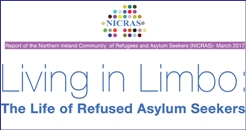 Living in Limbo - the life of a refused asylum seeker
Living in Limbo - the life of a refused asylum seeker
From a report by Northern Ireland Community of Refugees and Asylum Seekers (NICRAS)
What is day-to-day life really like for refused asylum seekers?
A person becomes a refused asylum seeker when their application to claim asylum in the United Kingdom is turned down by the Home Office. Rejecting an individual’s asylum claim simply means that they cannot remain in the United Kingdom as a refugee. In such circumstances an individual only has two real options available to them, either they can appeal the decision or they can voluntarily return to their home country. If they choose to do neither of these options, the Home Office will take steps to have them removed from the United Kingdom.
Refused asylum seekers therefore face immense uncertainty, as their continuing ability to reside in the United Kingdom is thrown into doubt. The pressure they are under is further increased by the challenges they face in securing basic needs such as food and accommodation.
In addition, this is a group of people who are especially prone to stereotyping and misrepresentation and, in such coverage, one thing is always notably absent - their own voices. The 'Living in Limbo' report has given refused asylum seekers an opportunity to tell their stories and to voice their opinions on the way they are treated. NICRAS surveyed 29 refused asylum seekers living in Northern Ireland.
What became clear is the difficulties that refused asylum seekers are likely to face in securing accommodation, financial support and basic essentials including food and clothing:
-
24% have endured a period of up to 6 months homeless, while 21% have been homeless for over 24 months.
-
39% were destitute at the time of being surveyed, as they were either sleeping on the streets or having to live with friends.
-
Only 33% of the respondents who were eligible for support from social services, actually approached social services for assistance.
-
79% stated that their health has been affected by the circumstances they have been put in.
-
63% of the respondents had spent over 24 months in the asylum process – signalling the heavy backlog and inefficiencies within the UK's asylum system.
Once individuals have had their asylum application refused they cease being eligible to receive asylum support (what is commonly referred to as Section 95 support of a £36.95pw, accommodation and small child allowances) and so, within 21 days of the decision, their weekly payments stop and they have to be evicted from National Asylum Support Service (NASS) accommodation.
When refused asylum seekers are unable to return to their home country and therefore have to remain in the United Kingdom for an indefinite period, they can apply for what is commonly referred to as Section 4 support.
As long as they meet the criteria, they can still receive Section 4 or Section 95 support. Unfortunately, there are four major problems with these provisions:
-
Section 95 support is only available to refused asylum seekers who have dependants under the age of 18.
-
Section 95 support can be removed if the family is not believed to be taking steps to leave the UK.
-
Section 4 support amounts to only £35.39 a week and is administered through a cashless ‘Azure’ card system. This is being gradually replaced by Aspen cards throughout the course of 2017.
-
Azure cards can only be spent in certain shops and only on certain ítems.
The refused asylum seekers become destitute and this affects physical and mental health, makes people vulnerable to abusive relationships and exploitation and increases the risk of absconding - living with family and friends without appearing on any records.
Some of the comments from the survey:
“I have to take clothes from rubbish, can’t clean myself properly”
“I have been in fear and terror, stress and nightmare in last 5 years”
“Putting people on the streets, it is hell”
“Being an asylum seeker, it’s like having a disease”
“No peace of mind, never know if you’ll be sleeping on the streets, especially in winter”
The report makes several recommendations regarding Housing, Health and Social Care, Home Office policy, UK and devolved Government policy.
Read the report here
Retweet about this article:
From a report by NICRAS, 22/08/2017